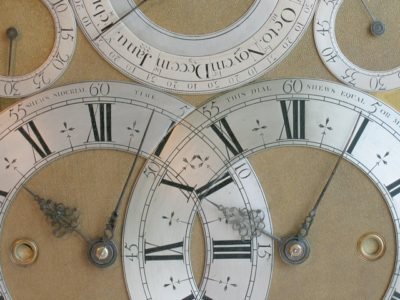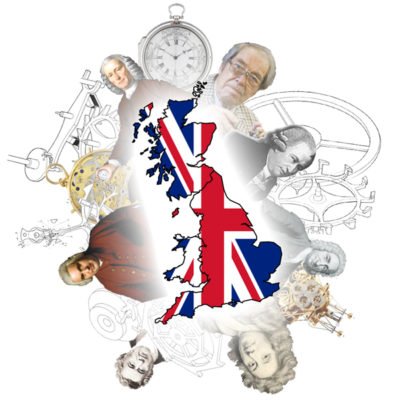Horology has been at the forefront of scientific discovery since the time of the Ancient Greeks. Below is a list of the most notable discoveries and achievements.
| Date | Invention | Inventor | Nationality |
| possibly 3rd C. BC | Toothed Wheel | possibly Archimedes (c.287 BC–c.212 BC) | Ancient Greek |
| 14th C. | Verge Escapement | Unknown | Unknown (possibly Britain) |
| c.1430 | Mainspring | Unknown | Unknown (possibly Germany) |
| 15th C. | Pocket Watch | Unknown | Unknown (possibly Germany) |
| 1602 | Pendulum | Galileo Galilei (1564–1642) | Italian |
| 1657 | Anchor Escapement | Robert Hooke (1635–1703) | British |
| 1657 | Balance Spring | Robert Hooke (1635–1703) | British |
| 1687 | Repeating Mechanism | Daniel Quare (1649-1724) | British |
| 1690 | Minute Hand | Daniel Quare (1649-1724) | British |
| 1695 | Cylinder Escapement | Thomas Tompion (1639–1713) | British |
| 1700 | Duplex Escapement | Robert Hooke (1635–1703) | British |
| 1704 | Jewelled Bearings | Nicolas Fatio de Duillier (1664-1753) | Swiss |
| 1715 | Dead beat Escapement | George Graham (1673–1751) | British |
| 1730 | Marine Chronometer | John Harrison (1693–1776) | British |
| 1753 | Temperature Compensation | John Harrison (1693–1776) | British |
| 1755 | Lever Escapement | Thomas Mudge (1715–1794) | British |
| 1760 | Gravity Escapement | Thomas Mudge (1715–1794) | British |
| 1760 | Going Barrel | Jean-Antoine Lepine (1720-1814) | French |
| 1765 | Centre Seconds | John Whitehurst (1713 –1788) | British |
| 1782 | Spring Detent Escapement | John Arnold (1736 –1799) | British |
| 1790 | Anti-shock Device | Abraham-Louis Breguet (1747–1823) | French |
| 1795 | Breguet Overcoil | Abraham-Louis Breguet (1747–1823) | French |
| 1801 | Tourbillon | Abraham-Louis Breguet (1747–1823) | French |
| 1807 | Chronograph | Thomas Young (1773–1829) | British |
| 1843 | Keyless Work | Jean Adrien Philippe (1815–1894) | French |
| 1868 | Pin Pallet Escapement | Georges F. Roskopf (1813–1889) | German |
| 1921 | Quartz Oscillator | Walter Guyton Cady (1874–1974) | American |
| 1923 | Self Winding Mechanism | John Harwood (1893–1964) | British |
| 1974 | Co-axial Escapement | George Daniels (1926-2011) | British |







Matt Webb
18 January, 2014 at 5:34 pm
Fantastic to see the time line. Even better to see some of the most iconic revolutions by british watchmakers.
Alexis Delon
22 October, 2015 at 3:57 am
Nicely organised table. Interesting to see that British time keepers invented a lot of things we currently use in watchmaking. Why is it that Switzerland has the monopoly of the watchmaking world?
Colin
9 January, 2016 at 1:14 pm
Hi Alexis, that’s a question with a long answer! The short answer is that the Swiss were far better at adopting mass-production in watch manufacture. They also had invested so heavily in the industry that when the watch industry collapsed elsewhere in the world after the emergence of the electronic watch, they were stubbourn and persisted on. Most watch companies went bust and were bought up cheapily by conglomorates like Swatch or the Richemont Group. Then the mechanical watch came back into fashion and the industry started to grow again. By this stage is was only the Swiss left, so they were the monopoly by default.
Seph Callaway III
9 September, 2024 at 4:31 pm
Hello,
I’m just delving into the history and development of British horology as it relates to both clocks and watches, so as to forage forward into a path of my own in the watchmaking industry. I personally find it fascinating, especially when an inventor gets credit for their discoveries. It’s only fair, even if they never financially benefited from their discoveries. This list is extensive and I printed it out. Is this list of just only the inventors that are known whom are British? What about Scottish or Irish? I guess what I’m eluding to is that as it relates to the British Isles as a whole, is this list inclusive of ‘all’ the known British inventors and if so, what about Scotland, Ireland and maybe even Wales?
Colin
10 September, 2024 at 5:08 pm
Hi Seph
Thanks for your comment. The list primarily focuses on British inventors, which includes all the nations of the British Isles, although the list will be heavily weighted towards the English, as historically they have had the larger population and the biggest influence on watchmaking.
Colin